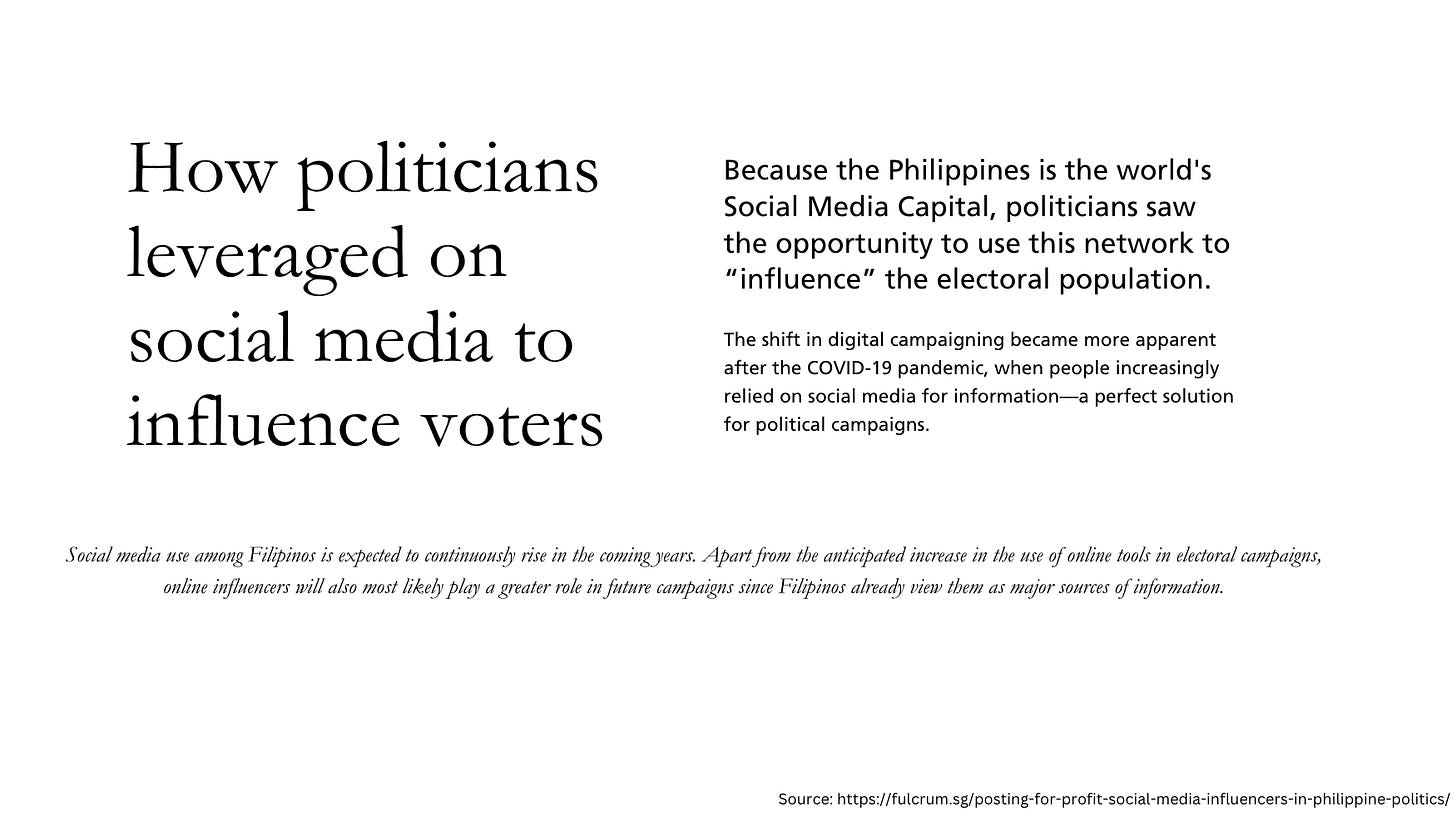Reading Newsletter #16: Rise of News Influencers, fake news and Filipinos, and 'Careless People'
News and current events that made me pay attention
News influencers regularly post about current events and civic issues on social media and have at least 100,000 followers on Facebook, Instagram, TikTok, X (formerly Twitter), or YouTube. News influencers can be journalists who are or were affiliated with a news organization or independent content creators, but they must be people and not organizations.
(Source: Pew Research)
Yesterday in class, I asked my students to spend a day with a news influencer for their final individual project for the term. This was after I had given them a 1.5-hour talk on online influencers turned newsmakers.
What makes a news influencer? According to this Forbes article, a news influencer is “a creator who consistently shares breaking insights on current events and civic issues across social media platforms.” They may be former journalists, independent content creators, or individuals who have built an online following by consistently creating content about current events worldwide.
“Unlike traditional journalists, who often work within the confines of established newsrooms and editorial boards, news influencers operate independently. They directly engage with their audiences and often cover stories that mainstream outlets overlook or see as too niche,” the Forbes article said.
News influencers (or online influencers) are not a new breed of amateurs doing “acts of journalism.” Since the web allowed self-publishing – aka blogging – individuals with writing chops became reporters or "citizen journalists.” When YouTube became available, individuals turned their blogs into vlogs (video blogs) covering political, social, and civic issues.
With the rise of Web 2.0, social media helped amplify and distribute content. What was once the domain of mainstream traditional media, individuals became their own media, churning out content after another and building their own audience—a handful attracting tens of millions of audiences.
Today, governments and politicians court these online influencers who happen to comment on current events and political issues because of their influence on their audiences. They are now seen as the “alternative media.” A Reuters Institute study, for example, showed the growing influence of online personalities on different social media platforms.
In the recent US elections, President-elect Donald Trump courted “YouTubers,” who gave him the platform to discuss almost anything. Podcaster Joe Rogan, for example, spent more than three hours talking to Trump. The YouTube interview shows more than 57M views as of this writing.
News influencers are increasingly becoming the news source for the younger generation, who spend more time on TikTok, YouTube, or Instagram. In the US, four out of 10 American adults under 30 admitted that they got news from news influencers. Recently, young Kenyans have also turned online, becoming news influencers when protesters stormed the country’s parliament.
News influencers and spread of fake news
In the Philippines, however, the House of Representatives raised concerns about the role of “social media influencers” in spreading misinformation, disinformation, or fake news. One Congressman invited 40 online influencers to a public hearing to understand how fake news spreads online and how this impacts “public perception and national security.” Only a handful of these online influencers appeared in Congress, with many calling the public hearing a violation of their rights to free speech.
A recent survey found that most Filipinos believe that fake news spreading online is a “serious” problem. However, Filipinos surveyed said they had difficulty identifying fake news from legitimate news that they read, watch, or hear from online sources. They even consider some traditional media outlets spreading disinformation or fake news.
With mid-term elections coming, history dictates that online influencers will be in high gear, churning content that supports politicians who now pay to get their messages out to targeted audiences. Instead of paying for online or digital ads, political strategists increasingly use online influencers to win the votes of constituents and the electorate.
“Filipinos are avid users of social media, and these platforms hold the potential to help build an informed electorate, or to sow divisiveness in service of political interests,” this article said.
Social media as a political force
Coincidentally, I happened to stumble upon this book, titled Careless People: A Cautionary Tale of Power, Greed, and Lost Idealism, by Sarah Wynn-Williams. It is a memoir of a former Meta (Facebook) employee who wrote an account of her work as the former director of global public policy.
Her story brings us to when she pitched to Facebook for a job that didn’t exist. As a diplomat, she wanted to help the social network deal with governments that will soon look at Facebook as contributing to spreading disinformation, among other content.
I’m still at 12% of the book, but so far, I can’t stop reading it. She writes very well and is (darkly) funny. She recalled key moments of her life at the world’s number one social media platform, including meeting Sheryl Sandberg for the first time (she’s in awe of her) and seeing Mark Zuckerberg, who reluctantly met with the Prime Minister of New Zealand.
Seeing Facebook as a means to stay connected with her friends, she believed the platform “was going to change the world.” When she was hired after months of waiting, she remembered thinking: “I can’t believe I have the opportunity to work on the greatest political tool of my lifetime.”
This tell-all memoir is a rare insider look at one of the most powerful companies in the world. From helping inspire the Arab Spring – a series of anti-government protests, uprisings, and armed rebellions that spread across much of the Arab world in the early 2010s- Facebook also helps politicians win elections.
Because of the book’s revelations, Meta temporarily stopped the author from further promoting the book. However, the book is now being sold online.
Author’s Note: The opinions expressed here do not represent my professional views. These opinions are solely my own.






